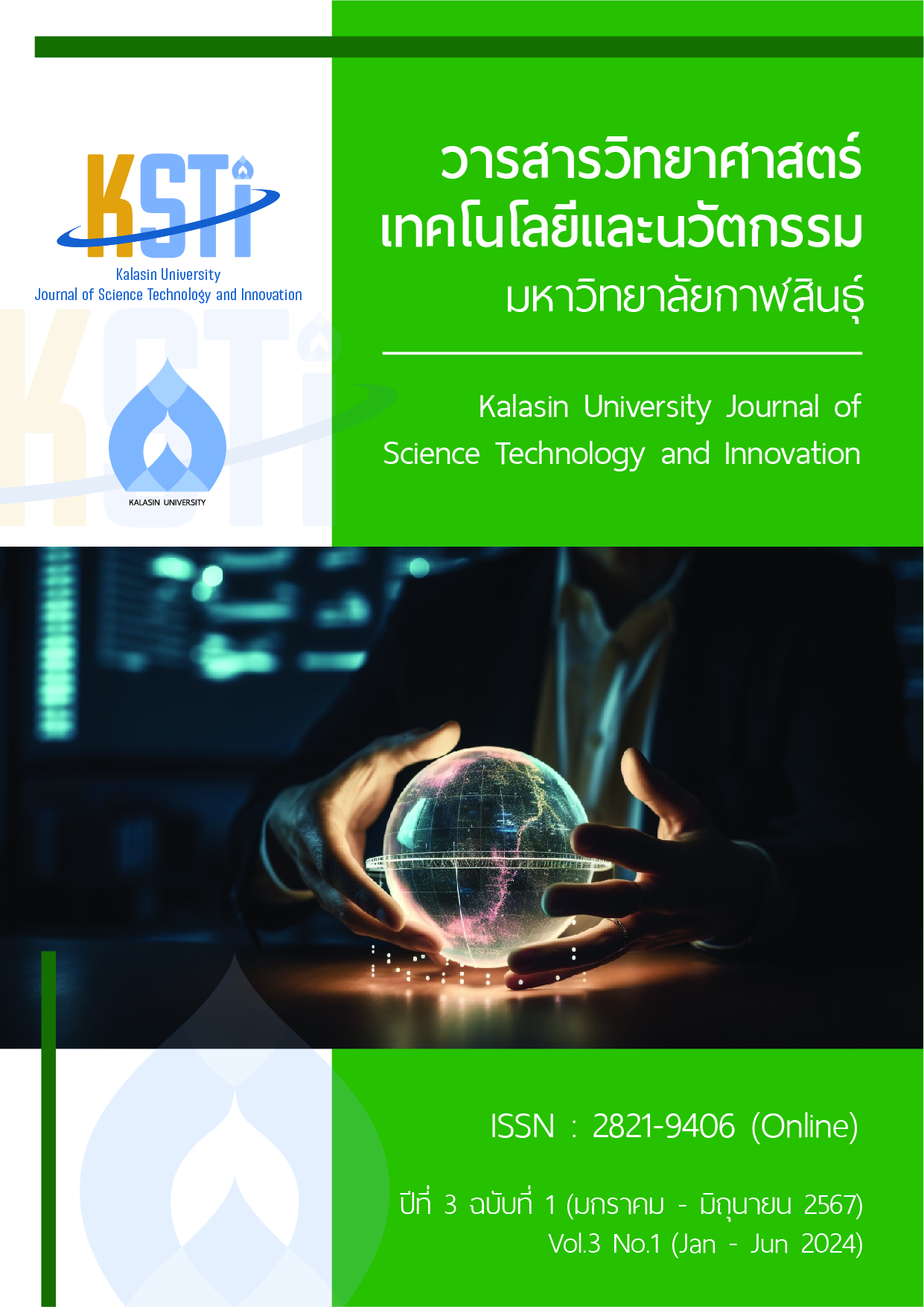Screening of Exopolysaccharide-Producing Drought Tolerant Rhizobacteria from Orchard Soils in Chanthaburi Province
Main Article Content
Abstract
Exopolysaccharide production of rhizobacteria strongly affects plant growth and drought tolerance. This work aims at evaluating the ability of bacteria previously isolated from the dry region of orchard soils in Chanthaburi province to produce catalase, oxidase and screening exopolysaccharide producing drought tolerant rhizobacteria. The findings revealed all 19 isolates were capable of producing catalase, while 8 isolates showed ability to generate oxidase. Furthermore, all 19 isolates exhibited exopolysaccharide production when cultured in a mineral salt medium (MS) supplemented with 15% w/v PEG 6000 to simulate drought stress. The results were confirmed using the modified alcian blue dye test, with percentages ranging from 6.76 to 45.02. Isolate MuD01-2, a gram-positive bacillus with a mucoid colony, was selected due to the highest EPS production (45.02 ± 1.15%). Additionally, isolate MuD01-2 presented high tolerance to water stress with a cell number of 9.47 ± 0.30 log CFU/ml after 6 days culturing in Tryptic Soy Broth (TSB) supplemented with 15% (w/v) PEG 6000. The results of water stress tests were not significantly different from those of the control without PEG 6000 (9.23 ± 0.15 log CFU/ml, p < 0.05). MUD01-2 showed high potential to be developed as a drought bioinoculant for application in orchard soils.
Downloads
Article Details

This work is licensed under a Creative Commons Attribution-NonCommercial-NoDerivatives 4.0 International License.
The owner (Research and Development Institute, Kalasin University), the authors agree that any copies of the article or any part thereof distributed or posted by them in print or electronic format as permitted will include the notice of copyright as stipulated in the journal and a full citation to the final published version of the contribution in the journal as published by Research and Development Institute, Kalasin University.
References
ฉรี สิงโต. ภัยแล้งทางการเกษตรของไทย [Internet]. 2566 [เผยแพร่ 2564; 16 กรกฎาคม 2566]. แหล่งข้อมูล: https://webapp.ldd.go.th/lpd/node_modules/Article_Lpd.
Admassie M, Woldehawariat Y, Alemu T, Gonzalez E, Jimenez JF. The role of plant growth-promoting bacteria in alleviating drought stress on pepper plants. Agric. Water Manag. 2022; 272: 107831. doi.org/10.1016/j.agwat.2022.107831.
ผู้จัดการออนไลน์. จันทบุรีฉลองยอดส่งออกทุเรียนทะลุ 500,000 ตัน สร้างรายได้เข้าไทยหลายแสนล้านบาท [Internet]. 2566 [เผยแพร่ 18 มิถุนายน 2566; 14 กรกฎาคม 2566]. แหล่งข้อมูล: https://mgronline.com/local/detail/9660000055415.
กรมส่งเสริมการเกษตร. เทคนิคการปลูกและดูแลรักษาทุเรียน [Internet]. 2566 [10 ตุลาคม 2566]. แหล่งข้อมูล: https://esc.doae.go.th/wp-content/uploads/2021/06/Durian.pdf.
ทวีศักดิ์ แสงอุดม และ ลาวัณย์ จันทร์อัมพร. การจัดการน้ำอย่างมีประสิทธิภาพสำหรับไม้ผล [Internet]. 2566[เผยแพร่ 2564; 14 กรกฎาคม 2566]. แหล่งข้อมูล: http://www.doa.go.th/hort/wp-content/uploads/2021/.
Ilyas N, Mumtaz K, Akhtar N, Yasmin H, Sayyed RZ, Khan W, et al. Exopolysaccharides producing bacteria for the amelioration of drought stress in wheat. Sustainability. 2020; 12(21): 8876. doi.org/10.3390/su12218876.
Ashry NM, Alaidaroos BA, Mohamed SA, Bodr OAM, El-Saadony MT, Esmael A. Utilization of drought-tolerant bacterial strains isolated from harsh soils as a plant growth-promoting rhizobacteria (PGPR). Saudi J. Biol. Sci. 2022; 29(3): 1760–69.
Naseem H, Ahsan M. Shahid M, Khan N. Exopolysaccharides producing rhizobacteria and their role in plant growth and drought tolerance. J Basic Microbiol. 2018; 58(12): 1009-22.
Bhagat N, Raghav M, Dubey S, Bedi N. Bacterial exopolysaccharides: insight into their role in plant abiotic stress tolerance. J. Microbiol. Biotechnol. 2021; 31(8): 1045-59.
Morcillo RJL, Manzanera M. The effects of plant-associated bacterial exopolysaccharides on plant abiotic stress tolerance. Metabolites. 2021; 11, 337. doi.org/10.3390/metabo11060337.
Das M, Nayak SK, Bhattacharyya P. Screening and optimization of exopolysaccharide producing bacteria from rhizospheric region of direct seeded rice. Int. J. Chem. Stud. 2020; 8(1): 292-7.
Latif M, Bukhari SAZ, Alotaibi FE, Ahmad M, Shahzad AN, Dewidar AZ, et al. Inducing drought tolerance in wheat through exopolysaccharide-producing rhizobacteria. Agronomy. 2022; 12(5): 1140. doi.org/10.3390/agronomy12051140.
Rajput VD, Harish, Singh RK, Verma KK, Sharma L, Quiroz-Figueroa FR, et al. Recent developments in enzymatic antioxidant defence mechanism in plants with special reference to abiotic stress. Biology.2021; 10(4): 267. doi: 10.3390/biology10040267.
จิรภัทร จันทมาลี และอัจฉรา เจริญรูป. ความหลากหลายของจุลินทรีย์ที่มีประโยชน์ทางการเกษตรในดินสวนผลไม้จังหวัดจันทบุรี. 2559. รายงานวิจัยฉบับสมบูรณ์ ประจำปีงบประมาณ 2558; สำนักบริหารโครงการส่งเสริมการวิจัยในอุดมศึกษาและพัฒนามหาวิทยาลัยวิจัยแห่งชาติ สำนักงานคณะกรรมการการอุดมศึกษา.
Anjali M. Isolation of catalase producing bacteria from soil. IJMCER. 2022; 11: 48-53.
Al-Dhabaan FA. Morphological, biochemical and molecular identification of petroleum hydrocarbons biodegradation bacteria isolated from oil polluted soil in Dhahran, Saud Arabia. Saudi J Biol Sci. 2018; 26(6): 1247-52.
Obuekwe CO, Al-Muttawa M. Self-immobilized bacterial cultures with potential for application as ready-to-use seeds for petroleum bioremediation. Biotechnol. Lett. 2011; 23: 1025–32.
Hussain MB, Zahir ZA, Asghar HN, Asgher M. Can catalase and exopolysaccharide producing rhizobia ameliorate drought stress in wheat?. Int J Agric Biol. 2014; 16: 3-13.
Zheng W, Zeng S, Bais H, LaManna JM, Hussey DS, Jacobson DL, et al. Plant growth- promoting rhizobacteria (PGPR) reduce evaporation and increase soil water retention. Water Resour. Res. 2018; 54(5): 3673-87.
Bogati K, Walczak M. The impact of drought stress on soil microbial community, enzyme activities and plants. Agronomy. 2022; 12(1): 189. doi.org/10.3390/agronomy12010189.


